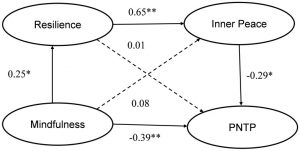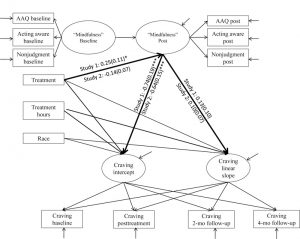Improve Resilience and Inner Peace to Reduce Negative Views of the Past with Mindfulness
By John M. de Castro, Ph.D.
“mindfulness promotes a more balanced time perspective, with a reduced focus on negative aspects of the past and negative anticipations of the future.” – Michael Rönnlund
Mindfulness stresses present moment awareness, minimizing focus on past memories and
future planning. Depression is characterized by a focus on the past while anxiety is characterized by focus on the future. This is representative of a past-negative time perspective which is a pessimistic negative view of what transpired in the past. Although awareness of the past and future are important, focus on the present moment generally leads to greater psychological health and well-being. This is generally characterized by inner peach which is a mild positive state with calmness and harmony in the mind. Although these concepts are well known, their interrelationships and the effect of meditation practice on them, have not been well studied.
In today’s Research News article “Dispositional Mindfulness and Past-Negative Time Perspective: The Differential Mediation Effects of Resilience and Inner Peace in Meditators and Non-Meditators.” (See summary below or view the full text of the study at: https://www.ncbi.nlm.nih.gov/pmc/articles/PMC7212969/), Ge and colleagues recruited adults over the internet who regularly meditated and those who did not. They completed questionnaires measuring their meditation experience, mindfulness, resilience, inner peace, and past-negative time perspective.
They found that mindfulness, resilience, and inner peace were all significantly and positively inter-related and negatively related to past-negative time perspective. They also found that the meditators had significantly higher levels of mindfulness and inner peace and lower levels of past-negative time perspective than the non-meditators. Structural equation modelling revealed that the negative relationship between mindfulness and past-negative time perspective was mediated by the relationships of mindfulness with resilience and inner peace. That is the higher the levels of mindfulness the higher the levels of resilience and inner peace which in turn were related to lower levels of past-negative time perspective. Non-meditators also had an additional direct negative relationship between mindfulness and past-negative time perspective.
It should be kept in mind that these results are correlational and causation cannot be determined. But they suggest that mindfulness is associated with greater ability to cope with difficulties, resilience, greater calmness and mental harmony, inner peace, and a less negative pessimistic perspective of past events. In addition, mindfulness’ relationship with less past-negative time perspective, in part, occurs due to mindfulness’ relationship with resilience and inner peace.
It can be postulated that mindfulness produces a positive state that is resistant to disruption by events and this produces a more positive assessment of what occurred in the past. This, in turn, prevents the emergence of negative emotional states such as anxiety and depression. This may represent a mechanism whereby mindfulness alters the individual’s psychological makeup resulting in greater psychological health and well-being.
So, improve resilience and inner peace to reduce negative views of the past with mindfulness.
“Mindfulness is about being fully aware of each moment in your life. Each thought, feeling, sensation and experience are accepted for what it is. There’s no battle going on in your head and heart. You are open to it ALL.” – Bev Janisch
CMCS – Center for Mindfulness and Contemplative Studies
This and other Contemplative Studies posts are also available on Google+ https://plus.google.com/106784388191201299496/posts and on Twitter @MindfulResearch
Study Summary
Ge, J., Yang, J., Song, J., Jiang, G., & Zheng, Y. (2020). Dispositional Mindfulness and Past-Negative Time Perspective: The Differential Mediation Effects of Resilience and Inner Peace in Meditators and Non-Meditators. Psychology research and behavior management, 13, 397–405. https://doi.org/10.2147/PRBM.S229705
Abstract
Purpose
Past-negative time perspective (PNTP) can affect our everyday lives and is associated with negative emotions, unhealthy behaviors, rumination, anxiety, depression, and post-traumatic stress disorder (PTSD). Dispositional mindfulness may be able to reduce the negative effects of PNTP; however, few studies have investigated their relationship. Thus, the purpose of this study was to explore the effect dispositional mindfulness has on PNTP, as well as the mediating role of resilience and inner peace in this regard.
Methods
This study investigated the cross-sectional relationship between self-reported mindfulness, resilience, inner peace, and PNTP. In order to further explore the relationship between mindfulness and PNTP, this study specially selected and analyzed the samples of 185 meditators and 181 non-meditators.
Results
Correlation analysis revealed that mindfulness is significantly positively correlated with resilience and inner peace. Conversely, PNTP is significantly negatively correlated with mindfulness, resilience, and inner peace. Structural equation model analysis revealed that resilience and inner peace partially mediated the relationship between mindfulness and PNTP. Furthermore, a multi-group analysis showed that the mediating effects are different between meditators and non-meditators. For meditators, the effect of mindfulness on PNTP was fully mediated by resilience and inner peace. For non-meditators, the effect of mindfulness on PNTP was only partially mediated by resilience and inner peace.
Conclusion
Based on the significant differences between the mediational models of meditators and non-meditators, we believe that dispositional mindfulness can negatively predict PNTP, and practicing meditation consistently improves dispositional mindfulness, resilience and inner peace and effectively reduces PNTP. Our findings indicate that a combination of mindfulness and PNTP could be used to design new psychological interventions to reduce the symptoms of mental health concerns such as negative bias, rumination, depression, anxiety, and PTSD.
https://www.ncbi.nlm.nih.gov/pmc/articles/PMC7212969/









